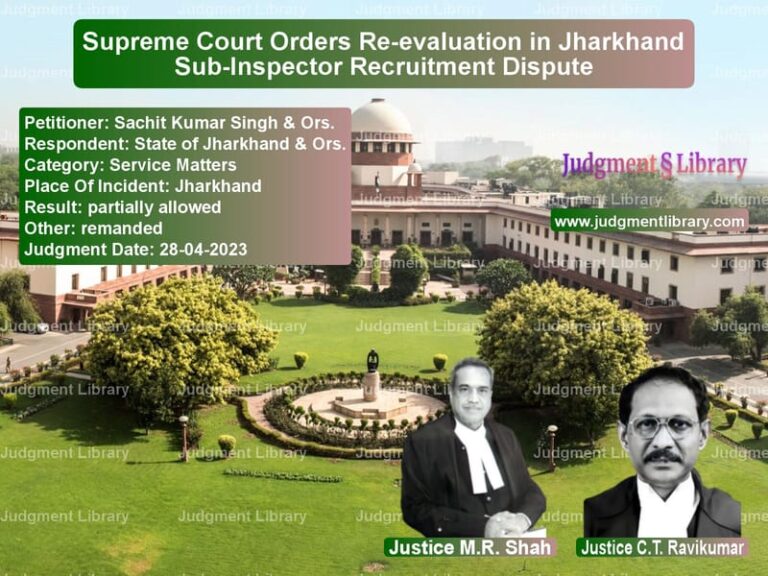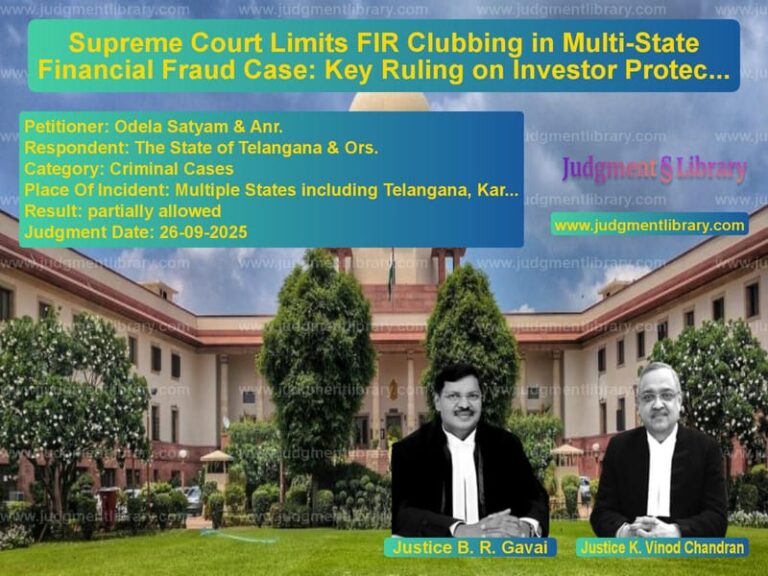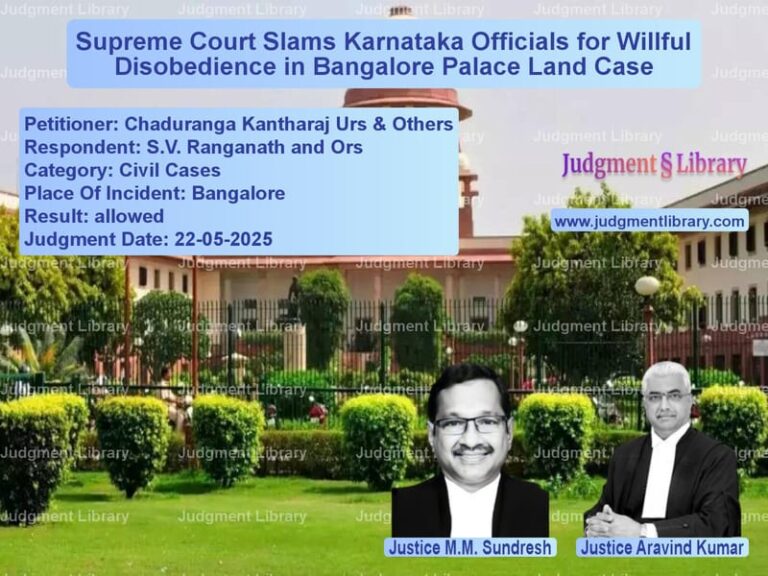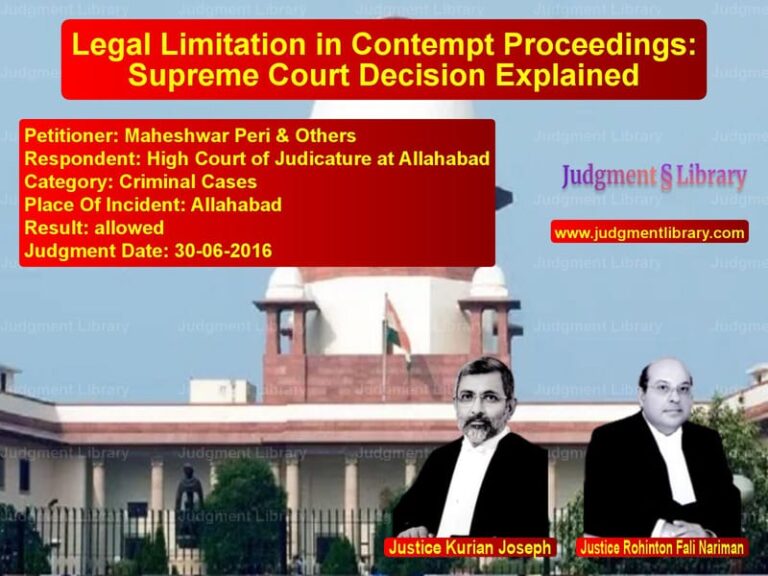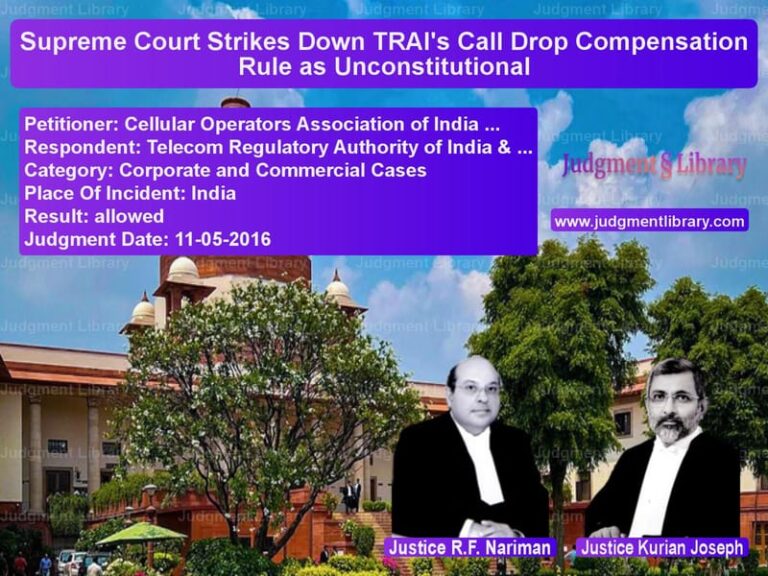Supreme Court Judgment on Family Business Appointment and Termination
The Supreme Court of India recently delivered a significant judgment in the case of Devendra Kumar Saxena v. Union of India & Ors., which addressed a complex family business dispute concerning the wrongful termination of an employee under the Indian government’s employment laws. The dispute arose from a disagreement between family members over their roles in managing a private company and the process of resolving employment disputes through formal arbitration, an issue that involved both legal and personal stakes.
Background of the Case
The case involved the termination of a teacher, Kamalini Khilar, who was appointed in 1998 under a Memorandum of Understanding (MoU) and later dismissed by the authorities in 2002 due to an order issued by the State Administrative Tribunal (SAT). Kamalini was accused of violating the terms of her employment, which she contended was unjustified given the facts of the case. She argued that the termination was arbitrary, given that she had served diligently for several years, and that her family’s involvement in the decision-making process led to her dismissal.
Read also: https://judgmentlibrary.com/supreme-court-denies-compassionate-appointment-after-10-year-delay/
The family dispute further intensified when the matter was escalated to the High Court, leading to conflicting interpretations of the legal framework governing employment and contractual obligations. Kamalini’s defense involved challenging the administrative order, but the legal proceedings soon took a new turn when arbitration clauses, initially part of the contract, became the central issue in the dispute.
The main argument before the Supreme Court revolved around whether the termination was valid under the terms set forth by the family and their agreements. Specifically, Kamalini challenged the appointment process and sought a judicial review of the contract’s provisions.
Petitioner’s Arguments (Devendra Kumar Saxena)
- The petitioner, representing the family of the deceased, argued that the termination had been unjust, and that Kamalini had not been given the opportunity to present her case adequately.
- The petitioner emphasized the principle of fairness in employment disputes, arguing that proper procedures were not followed before Kamalini’s termination.
- He further pointed out that the decision was influenced by improper political and personal considerations rather than legitimate business decisions, and that this adversely impacted his family’s interests.
- The petitioner sought the reinstatement of the terminated employee, claiming that a proper arbitration process had not been conducted as agreed in the Memorandum of Understanding.
Respondent’s Arguments (Union of India and Government Authorities)
- The respondent, Union of India, defended the termination of Kamalini Khilar’s employment, arguing that her actions were inconsistent with the contractual obligations outlined in the MoU.
- The respondents argued that, given the family’s involvement in the business, the internal business arrangement between family members had led to the failure of proper administrative procedures, making the termination legally and procedurally sound.
- The government authorities further contended that the agreement for arbitration was meant to be a tool for resolving internal conflicts and was not applicable in this case due to the overriding concerns of internal family politics.
- The respondents also argued that the arbitral panel had already ruled in favor of the termination, and that no further legal intervention was warranted in this case.
Supreme Court’s Analysis and Judgment
The Supreme Court, in its judgment, thoroughly analyzed the circumstances surrounding Kamalini Khilar’s termination, particularly focusing on whether the arbitration agreement within the MoU had been duly followed. The Court made the following observations:
- “While the issue of employment disputes within family businesses is sensitive, the principles of fairness and transparency must always prevail. In this case, the termination of Kamalini Khilar was not only arbitrary but also lacked the procedural safeguards guaranteed under the law and the internal agreements.”
- “The MoU’s provision for arbitration was not adhered to properly, as the family’s personal interests took precedence over the legal process. The failure to resolve the issue through arbitration led to the escalation of the dispute, creating an unnecessary burden on the judicial system.”
- “Furthermore, the termination violated the principle of natural justice, as Kamalini was not given an opportunity to present her side before the decision was made. A fair hearing was denied to her, and as such, the decision must be deemed invalid.”
- “The importance of a fair trial and adherence to the agreements made between parties cannot be overstated. In this case, the failure to adhere to the arbitration clause undermines the credibility of the process.”
Ultimately, the Court ruled in favor of the petitioner, directing the reinstatement of Kamalini Khilar and ordering the family business to engage in a proper arbitration process as originally agreed upon in the MoU.
Key Legal Principles Reinforced by the Judgment
- Enforcement of Arbitration Clauses: The ruling emphasized that agreements involving arbitration should be respected, especially when they are part of legally binding contracts. Courts are obligated to ensure that arbitration clauses are upheld unless there is a compelling reason to disregard them.
- Principles of Natural Justice: The judgment reinforced that any termination or legal action must comply with the principles of natural justice, which include the right to be heard and the right to fair treatment in legal proceedings.
- Fairness in Employment Disputes: The Court made it clear that employment disputes, especially those arising within family businesses, must be resolved in a manner that is fair, transparent, and in line with agreed-upon procedures.
Impact of the Judgment
This judgment has significant implications for family-run businesses and their internal governance. The Court’s decision stresses the importance of following fair processes and respecting legal agreements such as arbitration clauses. It underscores the fact that personal or political considerations within family-run businesses should not interfere with legitimate business decisions or legal rights of individuals.
Read also: https://judgmentlibrary.com/supreme-court-rules-on-ex-servicemens-seniority-in-punjab-civil-service/
Conclusion
The Supreme Court’s decision in Devendra Kumar Saxena v. Union of India is a landmark ruling that emphasizes the importance of adhering to contractual obligations, particularly in the context of family business disputes. The judgment highlights the need for fairness, transparency, and respect for the rule of law, ensuring that family businesses operate in a manner that protects the rights of all involved, including employees. The decision also underscores the crucial role of arbitration in resolving conflicts, reinforcing the idea that legal agreements must be followed to maintain stability and fairness in business operations.
Petitioner Name: Devendra Kumar Saxena.Respondent Name: Union of India & Ors..Judgment By: Justice L. Nageswara Rao, Justice S. Ravindra Bhat.Place Of Incident: Bhadrak, Odisha.Judgment Date: 09-04-2021.
Don’t miss out on the full details! Download the complete judgment in PDF format below and gain valuable insights instantly!
Download Judgment: devendra-kumar-saxen-vs-union-of-india-&-ors-supreme-court-of-india-judgment-dated-09-04-2021.pdf
Directly Download Judgment: Directly download this Judgment
See all petitions in Employment Disputes
See all petitions in Public Sector Employees
See all petitions in Workplace Harassment
See all petitions in Judgment by L. Nageswara Rao
See all petitions in Judgment by S Ravindra Bhat
See all petitions in allowed
See all petitions in supreme court of India judgments April 2021
See all petitions in 2021 judgments
See all posts in Service Matters Category
See all allowed petitions in Service Matters Category
See all Dismissed petitions in Service Matters Category
See all partially allowed petitions in Service Matters Category



